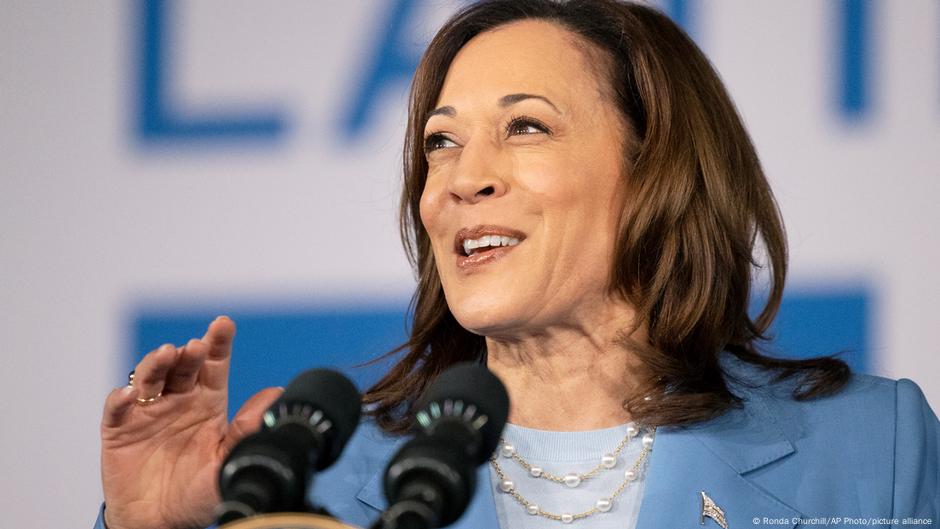- Web
- Feb 20, 2026
US election: What Kamala Harris would mean for the economy?

WEB DESK: As Joe Biden steps away from the presidential race a sense of hope has returned to Democrats. Businesses, on the other hand, are unsure what to make of a Harris government, and many are still bracing for Donald Trump.
Just last week, it looked like a near-foregone conclusion that Donald Trump would return to the White House after the November election.
But on Sunday, Joe Biden blew open the US presidential election by stepping out of the race and endorsing 59-year-old Vice President Kamala Harris.
She is expected to bring new momentum into the race and become the official Democratic nominee in August in Chicago. Harris has already seen a huge increase in fundraising, bringing in more than $81 million (€74.4 million) in the first 24 hours after Biden’s announcement.
It’s not just voters, donors or politicians who have taken notice. Businesses in the US and around the world are also taking stock of what this upheaval could mean. One thing companies don’t like is uncertainty. Biden’s decision to move aside as a candidate removes some of that uncertainty, but not all of it.
‘America First’ and the Democrats
For the country — and the economy — Biden’s decision guarantees a different president in 2025. The difference between Biden and Harris though is harder to decipher.
“Harris tends to be more progressive than Biden, though I’m not convinced there’d be a huge departure on the economy,” said Dan Mallinson, an associate professor of public policy and administration at Pennsylvania State University at Harrisburg. “They’re both pro-labor. Both supportive of expanding parental leave. Both supportive of social safety net policies like Medicaid, Medicare and Social Security.”
For many business leaders right now, it is less about what Kamala Harris and the Democrats stand for — as it is unlikely to differ much from what we have seen over the past few years. For them, it is more about which Trump policies Harris would stop in their tracks should she win.
One of Trump’s biggest goals is renewing his “America First” agenda. In addition to his harsh rhetoric on borders and immigration, Trump has proposed a 10% tariff increase on all US imports and even said he could impose a 60 per cent tariff on all imports from China.
While Biden has left many of Trump’s previous tariffs in place and even added more restrictions, they are targeted and aimed at specific industries. A blanket tariff on all imports would drive down competition and drive up prices for hard-hit Americans. Higher prices would lead to more inflation, which would keep interest rates high.
This prospect, and the fear of a global trade war, has upended business models and caused many companies to rethink how they will do business if Trump wins and imposes his will. These companies, especially those in China, are likely to breathe easy, for now, with Harris’ expected nomination likely to reenergize the Democrats.
Stocks, the dollar and crypto
A few US industries like traditional vehicle manufacturing, energy and cryptocurrencies may be feeling less enthusiastic about the increased possibility of a Democratic win. They had a place of pride in the Republican’s official election platform and were expecting a Trump boost.
The document promised deregulation for the fossil fuel industry and declared that “Republicans will end Democrats’ unlawful and un-American crypto crackdown and oppose the creation of a central bank digital currency.”
Now, investors may be recalibrating their political calculations and hopes for higher returns. While renewable energy producers and electric vehicle manufacturers are likely hoping for the status quo of a Harris win.
Yet, any major policy changes are months away and are currently just theory. On Monday, European stock markets closed the day higher as did stocks on the Wall Street backed by gains in Big Tech shares.
What would a Harris economy look like?
Kamala Harris has said little so far about the economy and how she would run it. Looking back at her time as a Californian prosecutor, attorney general, senator and US vice president gives a little insight though.
As attorney general she was tough on oil companies and banks. As vice president she supported Biden’s big economic plans including building up green energy, the American Rescue Plan and the Inflation Reduction Act. She also backed the CHIPS and Science Act, which is investing billions to encourage chip manufacturing at home.
Harris has argued against blanket tariffs but would keep an eye on China, which is in line with current government policies.
Whatever her ideas are, she will need to quickly show American voters her vision for the economy. Does she have new ideas or will she be Biden 2.0 in terms of the economy?
“One of the challenges that Harris will have now is carving out her own place while also defending what the Biden-Harris Administration did. That includes the economy,” Mallinson told DW.
Read more: World registers hottest day ever recorded on July 21
If she can convince enough voters that she can lower inflation and create jobs all while not turning the global economy upside down, she may have a chance to become the first female president of the United States.





